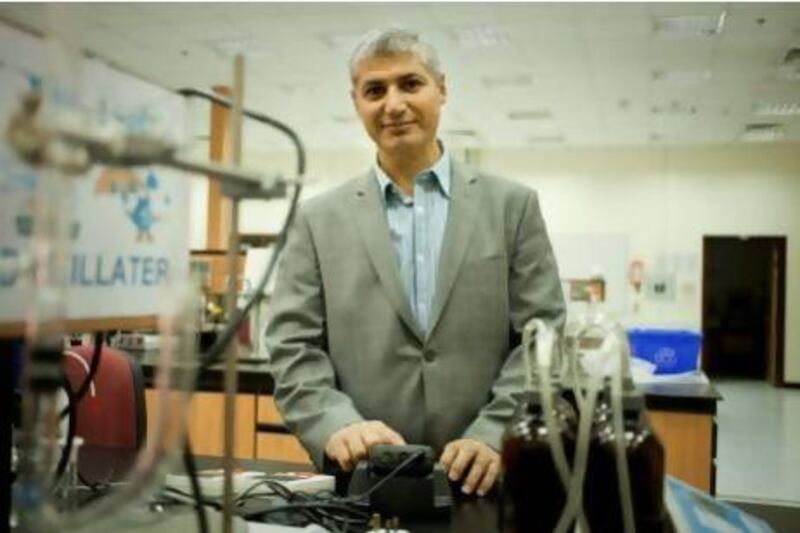In a country where fresh water is a precious commodity, it probably comes as a surprise to learn that millions of litres are quite literally flushed down the drain every day.
In every UAE household, up to 30 per cent of clean water consumed is used just to flush the lavatory.
The quality of this water is the same as that which comes out the tap, so is essentially good enough to drink. And with groundwater supplies depleting, this huge waste is becoming harder and harder to justify.
A new report by a professor at the University of Sharjah examines the issue and presents a simple solution - using greywater, essentially recycled water, to flush lavatories in multi-storey residential buildings.
Wastewater from showers, baths and possibly washing machines, which are supplied with fresh water, could be treated in a system within the buildings, then used to flush lavatories.
The report, A Framework for Reducing Water Demand in Multi-Storey and Detached Dwelling in the United Arab Emirates states that, based on local water consumption figures, greywater from 14 higher floors would serve the flushing needs of a 30-storey building.
The greywater recycling system should be placed on the roof of the building to reduce the need for indoor space or expensive odour-control systems.
"The concentration of the UAE population in multi-storey buildings in urban areas makes residential water conservation, including greywater recycling, a highly attractive option for reducing water demand and wastewater generation," the report states.
It goes on to say that while the country's recycling policies and legal frameworks do not encourage greywater recycling, "significant potential" for this exists.
"Water issues are very important for the UAE. We are spending a lot of money on desalination and all the other infrastructure that goes with it," says one of the authors of the report, Professor Abdallah Shanableh, an environmental engineer at University of Sharjah.
"We need to do whatever we can to reduce consumption of water.
"At the moment they are meeting demand for water but the major problem is we don't have renewable sources. Groundwater supplies are depleting year after year because we don't have rain water to replenish supplies."
Prof Shanableh's 2012 academic paper, written in conjunction with scholars from the Swinburne University of Technology in Melbourne and the University Putra Malaysia, states that the total water consumption in Dubai is about 550 litres per person per day.
The figures for Abu Dhabi are very similar, with between 525 and 600 litres per head used each day, according to the Regulation and Supervision Bureau.
Demand is expected to increase as the country develops and urban and industrial areas spread. An official from the Environment Agency-Abu Dhabi said in May that water supplies from the ground were at risk of running out within the next 55 years if extraction rates continue at the current rate. Based on the water consumption figures for Dubai, for example, saving 30 per cent of clean water by instead using greywater would see the emirate use 385 litres per person daily instead of the current 550.
An important consideration is the cost of installing and running such a system.
The report says that a building with less than 10 floors would recover the cost in less than a decade. A building with more than 10 floors could do it in five years.
But one problem is that many apartment owners do not live in their properties and do not pay the water bills, so the incentive to reduce water usage is not there.
"With less than 15 per cent of the population being UAE nationals who effectively receive free or highly subsidised water, implementation of water-saving measures for this sector of the population is not economically feasible unless such measures and their implementation are highly subsidised by the government," the report says.
"The remaining more than 85 per cent of the population are expatriates who mostly do not own their own homes.
"Consequently, the incentive for landlords to provide the infrastructure necessary for water conservation and greywater recycling is currently limited or non-existent."
Government subsidies are not conducive to saving water. In Abu Dhabi, a resident using Dh45 (five units) worth of water a month will pay only Dh11 because of the Dh34 subsidy. There is little incentive for the bill payer and/or the landlord to cut this further.
There are also cultural issues, related to the perceptions of clean and dirty water.
"This kind of proposal needs a lot of thinking," says Professor Shanableh. "We are just looking at technical feasibility. It sounds reasonable but there are many other considerations.
"If we do want treatment, that brings some health and safety issues and social issues with regards to the culture and cleanliness.
"Being Muslim and dealing with wastewater may not be considered clean, even after it is treated. It is a challenge."
Paul Williams, of Gulf Green Environmental, a Masdar-based company specialising in energy saving and water-recycling systems, agrees that people might have reservations, but says the country can ill afford to ignore such an effective scheme.
"It is pushing against an open door, people just have to be reassured about the quality," he says. "That's why an amount of legislation does come into it. There must be levels of quality for people to attain.
"The water treated by the sewage treatment centre is often reused as environment water, but usually it isn't particularly well polished. This is a different system.
"If greywater systems were put in, people wouldn't think twice about it. It doesn't need to be made a big thing of. It is completely safe and conforms with all the standards."
Mr Williams's company has not installed greywater lavatory and irrigation recycling systems in any multi-storey building in the Emirates, but has done so in other GCC countries.
They were responsible for installing a greywater recycling system for lavatories and irrigation at a hotel in Jordan.
"Hotels are definitely coming round to the idea, especially for irrigation. Everybody thinks its's a good idea in principal, however it's a matter of implementation. That comes down to awareness," Mr Williams says.
Government regulation is needed to encourage developers to adopt environmentally friendly technologies, particularly when it comes to water security.
Abu Dhabi has made advances with this thanks to its Estidama green-building rating system, which evaluates villas, buildings and communities.
All buildings must achieve at least one pearl out of five in its rating system. Through a system of required credits and extra points, Estidama promotes projects that are energy-efficient, use less water and create a healthier living environment.
There are no requirements governing greywater recycling in new or existing buildings. Federal law requires that any collection and treatment of wastewater or greywater needs to be licensed.
"Sixty per cent of all the water we have in our home is greywater," says Professor Shanableh. "This is too much to waste. But it requires government policy. We need to research the logistics and the technology.
"It is the landlords who have to pay for it, not the tenant. Why would he or she do this if it costs them more and they are not the ones paying for the water?
"This gap can be solved with policy and regulations. The regulations drive these kinds of achievements and changes."
[ munderwood@thenational.ae ]





